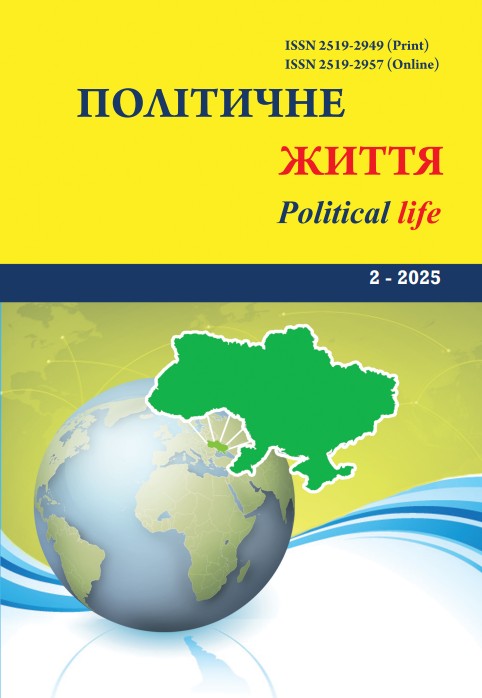The change in the climatic conditions of the world as a global challenge of power transformations
DOI:
https://doi.org/10.31558/2519-2949.2025.2.15Keywords:
global problems, climate change, ecology, environmental policy, political power, power relations, environmental awareness, environmental culture, environmental diplomacyAbstract
The article examines the impact of global challenges, in particular climate change, on power relations. The author defines climate change as a problem that causes a number of negative consequences for the development of society, in particular significant economic losses, shortage of drinking water, deterioration of water quality, new diseases, an increase in the number of environmental refugees, etc. This global challenge affects the nature of power relations, which increases the awareness and responsibility of political actors in maintaining environmental security at the state level, as well as the need to represent the economic and environmental interests of the state, joint activities at the international level, in particular in determining the organizational structures of management regarding the environmental security of the planet. The article emphasizes that the governments of modern countries are faced with the need to develop and implement long-term strategies focused on adapting the economy, infrastructure and social policy to new realities. The author emphasizes the importance of including environmental priorities in the development strategies of modern society and the need for international coordination to create effective mechanisms for managing global environmental threats. The author analyzes the stages of the formation of international cooperation in the field of climate security, starting from 1972, when the UN Environment Program was created. This initiated scientific research on climate change and intergovernmental cooperation. The article examines the UN Framework Convention on Climate Change (1992), the Kyoto Protocol (1997) and the Paris Agreement (2015). The article reveals the significance of these key documents that define global approaches to combating climate change and establish the principles of sustainable development. The author draws attention to the importance of developing environmental diplomacy as a means of forming international dialogue and harmonizing the positions of different countries. The author analyzes efforts aimed at integrating green technologies, developing renewable energy and introducing legislative initiatives aimed at reducing the burden on the environment. The article notes that one of the key elements of implementing environmental policy is the environmental responsibility of not only the state, but also society. The article emphasizes that strategically important tasks and directions of environmental policy of modern states are the activation of both domestic and foreign political cooperation, international cooperation, promotion of the formation of environmental awareness and culture of citizens, environmental diplomacy, overcoming socio-political inertia. countries in the formation of an environmentally safe future. It is concluded that the success of the implementation of environmental policy depends on the ability to overcome socio-political inertia and involve all stakeholders in a joint solution to the problem of preserving ecosystems for current and future generations.
References
Бохан А. Інтегратори екологічної дипломатії. Вісник КНТЕУ. 2016. № 5. С. 19–30.
Бохан А. Екологічна дипломатія: науково-концептуальний вимір. Ефективна економіка. 2022. № 3. URL: http://www.economy.nayka.com.ua/pdf/3_2022/3.pdf
Гнатишин М.А. Паризька угода: прогрес в імплементації та торговельні аспекти. Ефективна економіка. 2019. Вип. 3. URL: http://www.economy.nayka.com.ua/pdf/3_2019/37.pdf
Довбенко М. Кіотський протокол як перспективне джерело додаткових інвестицій. Вісн. НАН України. 2009. № 3. С.26-34.
Дубовіч І. А. Булгаков М.Г. Теоретико-методологічні та практичні еколого-економічні та правові засади розв’язання глобальних проблем зі зміни клімату. Науковий вісник Ужгородського національного університету. Серія: Міжнародні економічні відносини та світове господарство. 2016. Вип. 8. Частина 1. С. 67-70.
Дячук О.А. Внесок України до глобальної кліматичної угоди. Економіка і прогнозування. 2016. № 1. С. 129-141.
Кіотський протокол до Рамкової конвенції Організації Об'єднаних Націй про зміну клімату. Кіотський протокол ратифіковано Законом N 1430-IV (1430-15) від 04.02.2004. URL: https://zakon.rada.gov.ua/laws/show/995_801#Text.
Кучеренко І.М. Трансформація влади в сучасній Україні: моральна і політична специфіка. Наукові записки ІПіЕНД ім. І. Ф. Кураса НАН України. 2018. Вип.45. С. 191-200.
Лицур, І. М., Гребенюк, О. В. Дослідження проблем впровадження пунктів Кіотського протоколу на мезо і макрорівні. Наукові праці Лісівничої академії наук України: збірник наукових праць. Львів: РВВ НЛТУ України. 2014. Вип. 12.С. 216-220.
Макаренко Є. А. Аналітичні розробки дослідницьких центрів в США у сфері забезпечення національних інтересів держави. Актуальні проблеми міжнародних відносин. 2012. Вип. 107 (Частина I). С. 54-65.
Рамкова конвенція Організації Об’єднаних Націй про зміну клімату. Конвенцію ратифіковано Законом N 435/96-ВР від 29.10.96, ВВР, 1996, N 50, ст. 277.
Сердюченко Н. Міжнародні угоди із зміни клімату. Світогляд. 2008. №1. С. 32-35.
Сівак Н. М., Павлун Ю. І. Безпечне природне середовище як елемент національної безпеки України: сучасні виклики, загрози та ризики. Публічне адміністрування: теорія і практика. 2012. Вип. 2(24). URL: http://nbuv.gov.ua/UJRN/Patp_2012_2_24.
Ши Джеймі. Лекція 2. Кліматичні зміни. НАТО, 15.12.2009. URL: https://www.nato.int/cps/uk/natolive/opinions_84763.htm
Шинкарук Л. А., Щодро О. Є., Пірко А. Б. Регулювання русел і протипаводковий захист в умовах глобалізації кліматичних змін. Вісник НУВГП Серія «Технічні науки». 2016. Вип. 3(75). С. 91-97.
Шкуропадська Д. Стійкість національної економіки в контексті глобальних викликів. Зовнішня торгівля: економіка, фінанси, право. 2017. № 4. С.84-97.
Adoption of the Paris Agreement. The Framework Convention UN on Climate Change. https://unfccc.int/resource/docs/2015/cop21/eng/l09r01.pdf.
AGENDA 21 United Nations Conference on Environment and Development, Rio de Janeiro, June 1992https://www.un.org/depts/german/conf/agenda21/agenda_21.pdf.
Climate Change 2001: The science base. Contribution of working group I to the IPCC. The third assessment Report. UNEP/WMO, 2001. 520 p.
Climate Change 2022: Impacts, Adaptation and Vulnerability. Contribution of Working Group II to the Sixth Assessment Report of the Intergovernmental Panel on Climate Change [H.-O. Pörtner, D.C. Roberts, M. Tignor, E.S. Poloczanska, K. Mintenbeck, A. Alegría, M. Craig, S. Langsdorf, S. Löschke, V. Möller, A. Okem, B. Rama (eds.)]. Cambridge University Press. Cambridge University Press, Cambridge, UK and New York, NY, USA, 3056 pp.
Climate Change 2023. Synthesis Report. Summary for Policymakers. A Report of the Intergovernmental Panel on Climate Change. URL: https://www.ipcc.ch/report/ar6/syr/downloads/report/IPCC_AR6_SYR_SPM.pdf.

